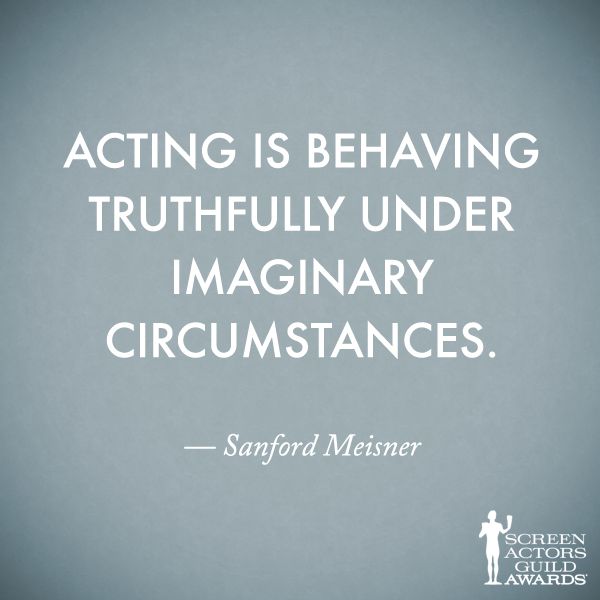Imaginary Circumstances
I’m late writing this post, because, frankly, I wasn’t sure how to write it. I had a really great experience on Monday evening. The experience left me feeling, simultaneously, immensely proud, and completely humble. It was probably the very greatest moment of my acting career to date, and it was only a cold-reading of a 10-minute play. I really enjoyed reading each of the roles I was given, and I am forever grateful to the playwrights who cast me. But how do you adequately thank a playwright who allowed you to experience such a profound, personal moment, and gave you the renewed sense of self-assuredness you needed to move further in your career?
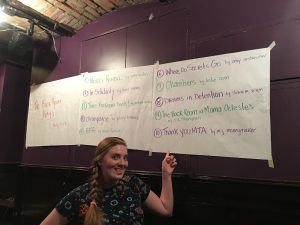
On Monday, I had the privilege and honor to participate in The Bechdel Group’s 24-hour Playwriting Challenge. The goal of The Bechdel Group is to develop multi-layered, interesting roles for women. On this evening, 10 plays were read, and each of them had really interesting stories, and featured intriguing characters.
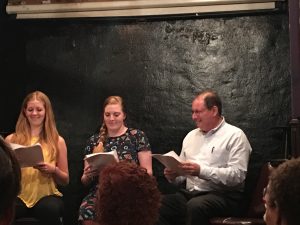
In Solidarity
I was asked to read in three of the ten plays, so in the course of the evening, I played a newlywed woman who helps her sister overcome her fear about disappointing their mother; a lesbian riding the subway home after having a fight with her girlfriend at a party; and a teenage girl holding in a big, and quite terrifying, secret. Quite a range, if I do say so myself! I loved having the opportunities to bring each of these characters to life, but the role that stayed with me for a while after I stepped off the stage was Patty, the teenage girl.
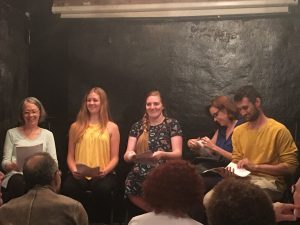
Thank you MTA
Before I get into that, though, I need to give a little bit of backstory: I have been acting since before I can remember. I’ve been participating in school and church plays and musicals since I was a little bitty kid. I have a natural knack for acting and performance, which led me to want to study acting more in depth in high school and college. In all my studies, and all my performances, I made great strides. I grew A LOT as a performer, especially in college, and in the months immediately following. But there was one thing I could never quite manage: crying on cue. In fact, I remember very vividly our UIL One-Act Play my senior year in high school. We were doing 1984, and I was playing Parsons. There was a scene in which I was directed to enter, obviously emotional, and crying. I accomplished this task exactly ONCE, during a rehearsal. We had been working this particular scene for a little while already, and I was unable to produce the necessary emotional expression. The director brought me into the hallway, and talked to me about how I could conjure up some tears, by maybe thinking about a specific person whom I had lost, and a specific item associated with that person. Because I was embarrassed and already worked up, the tears flowed easily, and I even was applauded by my cast mates at the end of the rehearsal. But I was never able to reproduce those tears in performance! I even asked a dear friend of mine to make me cry before I had to go on stage, and he tried. Valiantly. He said some really mean things, and if I hadn’t taken the time to calm down and convince myself that he was just saying them in order to acquiesce to my request, it would have been successful!
Over the years, I have sought advice and insights on how to make yourself cry on stage. I have heard stories about people who sneakily dab their eyes with salt in order to get the tears flowing. Whenever something would happen in my real life that upset me, my mom would tell me “This is fodder for when you need to cry on stage!” (Thanks, Mom…) But recently, I read an article that said not to focus on the tears. If tears are your goal, you’re thinking about it in the wrong way. The point is the emotion. You can convey sadness, anger, or fear without crying, so stop trying to make crying your goal! This backed up something I learned in my Intermediate Acting class in college. We studied the technique developed by Sanford Meisner, whose whole philosophy is to stay in the moment. Stay in the moment with your scene partner, and allow the feelings your character feels to flow. Use your natural reactions to enhance your work; your natural emotions are more interesting than fabricated ones, anyway. He says that “acting is behaving truthfully under imaginary circumstances.”
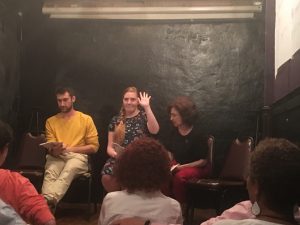
Where Do Secrets Go?
On Monday evening, I began to read the play “Where Do Secrets Go?” I was playing Patty, the teenage girl with the big secret. As the play goes, we learn that Patty is a gifted singer, and has been taking voice lessons from her godfather for a couple of years. Lately, Patty has not been acting like her usual self, her friends don’t really come around anymore, and her mother and brother are worried for her. Come to find out, Patty’s voice teacher has sexually abused her. As I was reading this play, and portraying this character, I really listened to what I was reading, and I allowed myself to imagine that this was really happening to me. And as I was reading Patty’s monologue in which she finally tells her mother everything she’s been hiding from her for so long, I realized that I was crying. I wasn’t trying to make myself cry. It just happened. I was crying because I was scared and humiliated, and I just wanted everything to be OK. And then the play was over. I wiped my tears away, stepped off the stage, and I was fine. I wasn’t scared or humiliated, and everything was great, as far as I was concerned.
I struggled to write this post, because I have struggled with making sense of my experience on Monday night. For the few minutes I was playing Patty, all that mattered was that I was scared, and I needed my mom to help me. But when it was over, I wasn’t scared at all anymore. It was as though I really was Patty for a few minutes, and then, pretty smoothly, I was Emily again. My mom was so impressed that I had FINALLY managed to cry on demand, and wanted to know what I was thinking about to make that happen. And the truth is, I was thinking about the words I was saying, and the story I was telling. It was the greatest acting moment of my life, because I wasn’t forcing it. I was simply living truthfully in imaginary circumstances.
